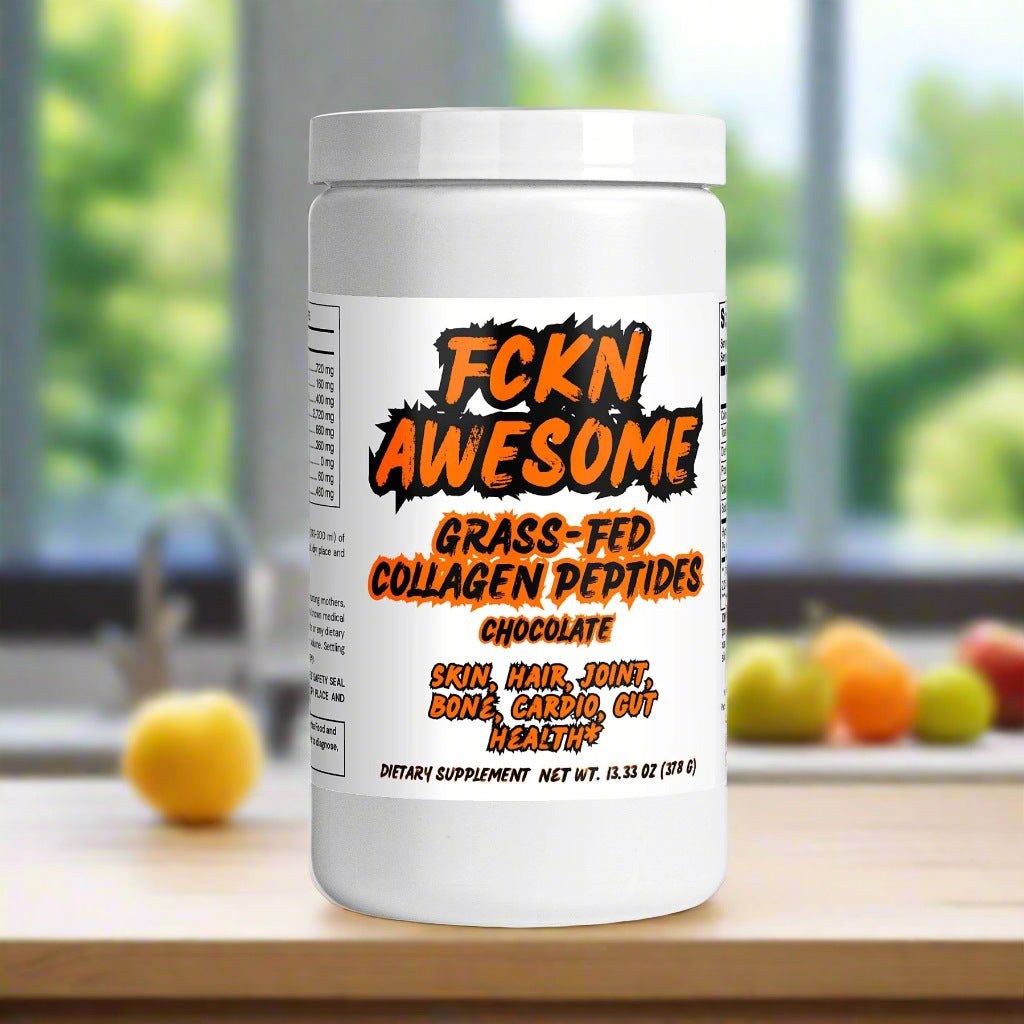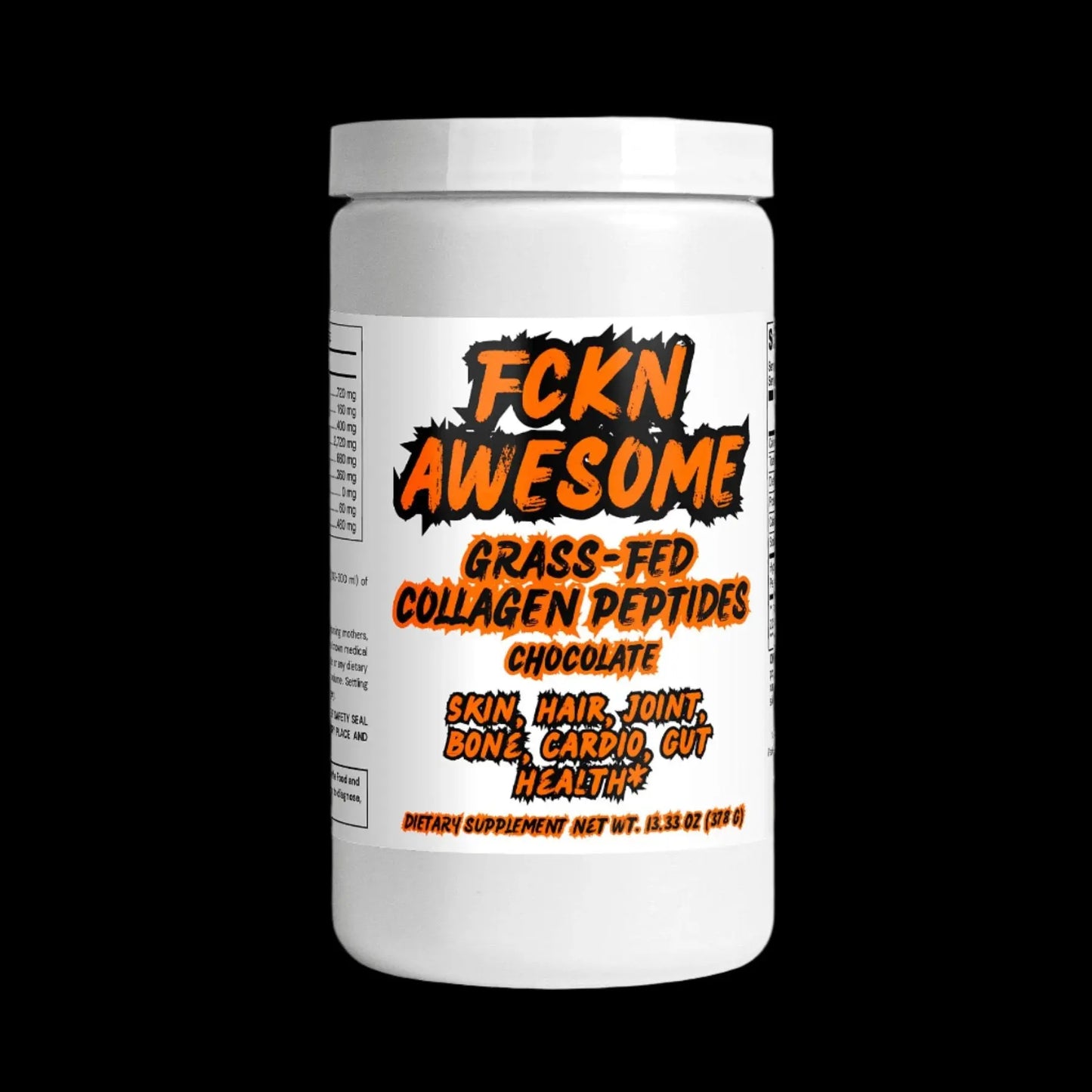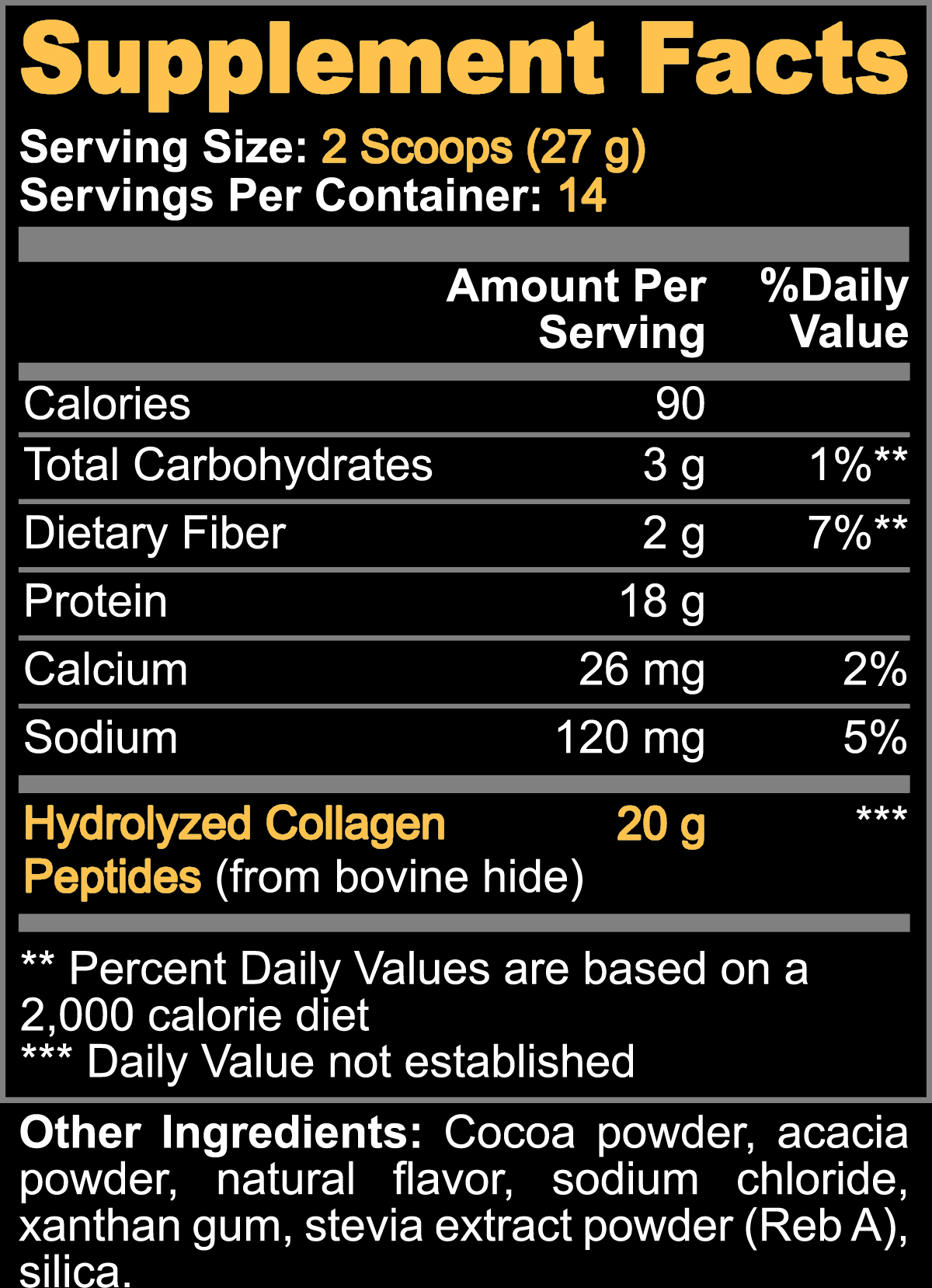
Collagen Benefits for 🧬Anti-Aging: Health, Youth, and Glow
Share
Collagen is often called the building block of beauty, and for a good reason. This essential protein plays a vital role in maintaining the structure and elasticity of your skin, the strength of your hair and nails, the health of your joints and bones, and more.
With age, body’s natural collagen production may decline, leading to visible signs of aging, such as wrinkles, sagging skin, and joint discomfort. Fortunately, scientific research shows that collagen supplementation can counteract these effects and promote rejuvenation from the inside out.
Explore how collagen supports your skin, hair, nails, joints, and bones — for a healthier, more vibrant You.

Collagen in the Body (adapted from Campos, L. D. et al., 2023)
😍 Skin Health & Youth
The skin is the body’s largest organ.
Collagen, elastin, and hyaluronic acid — are the 3 main components of the skin. They are produced by fibroblast cells in the skin. [1]
Collagen constitutes 80% of the dry weight of human skin. [2]

Structure of young, healthy skin and the effect of aging on its structure (adapted from Campos, L. D. et al., 2023)
Oral collagen supplementation restores collagen, elastin, and hyaluronic acid synthesis by stimulating fibroblast cells and by providing them with building blocks. [3]
- supports the skin's structural integrity,
- improves skin hydration and elasticity,
- reduces the appearance of wrinkles,
- and promotes overall skin health.
Clinical Studies
- A 2020 review of 10 randomized, placebo-controlled human studies has concluded that 10/10 studies have shown improved skin health, such as moisture, elasticity, wrinkle number, and dryness. Studies ranged in duration from 8 weeks to 12 months, with results apparent as soon as 6 weeks, and used doses up to 10 g/day. [4]
- A 2021 review of 19 clinical studies, with a total of 1125 participants aged 20-70 years, has concluded: "...collagen peptides can delay and improve the signs of skin aging by decreasing facial wrinkles and improving skin hydration and elasticity, while the supplementation is maintained. The time required to delay skin aging in most studies was 90 days, and the result was maintained for 4 weeks after the end of supplement administrations... Supplement intake is effective and safe because no adverse effects were reported in any of the analyzed studies..." [5]
- A 2023 systematic review and meta-analysis of 26 randomized controlled trials (RCTs) involving 1721 patients has shown that hydrolyzed collagen supplementation significantly improved skin hydration and elasticity compared to the placebo group. [2] Although several studies exhibited "some concerns" of bias (like the source of funding), the vast majority of studies consistently demonstrated significant improvements in skin parameters (see forest plots below). [2, 6]

Meta-analysis of studies evaluating skin hydration in patients supplemented with hydrolyzed collagen and patients in the placebo group (adapted from Pu, S.-Y. et al., 2023)

Meta-analysis of studies evaluating skin elasticity in patients supplemented with hydrolyzed collagen and patients in the placebo group (adapted from Pu, S.-Y. et al., 2023)
For example, the most recent 2024 randomized double-blind placebo-controlled study of 80 women aged 30 years and older has concluded: "After 6 weeks, participants that received collagen had significant improvements in biometric skin wrinkle parameters from baseline, with a reduction in volume by 46%, in area by 44%, and in depth by 9%, along with a greater increase in skin moisturization (by 34%) than those in the placebo group" [7]

Changes in Skin parameters (on crow’s feet) after 6 weeks of Collagen Peptides intake in healthy women aged 30-65, in the 2024 clinical study (adapted from Carrillo-Norte, J. A. et al., 2024)
🤩 Hair & Nails Health
Cell & Animal Studies
- "...collagen peptides may help to prevent hair loss and maintain healthy hair by preserving epithelial HF stem cells and/or improving the generation of stem cells progenies." [8]
- "...collagen peptides could be used as food supplements and nutraceuticals for hair loss prevention as well as hair regrowth during alopecia." [9]
- "...[Low molecular weight collagen peptide] has the potential to increase hair growth via activating the Wnt/β-catenin signaling pathway." [10]
Clinical Studies
There were 3 human studies regarding collagen effects on hair health [11, 12, 13], and 1 on nails [14]:
- "An oral supplement containing hydrolyzed fish-origin collagen, taurine, cysteine, methionine, iron, and selenium has demonstrated to improve the clinical efficacy of specific anti-hair loss treatments in subjects with androgenic alopecia or telogen effluvium." [11]
- "It was observed after 56 days that therapy with SRC (the mix of 5g Collagen Peptides, vitamins C and E, Hyaluronic Acid, and Biotin), compared to placebo, produced a substantial effect on reduction of wrinkle depth and fine lines by 48.11% and 39%, respectively. There was a 15.69% improvement in skin hydration observed and 28% reduction in hair fall." [12]
- After 12 weeks [hydrolyzed collagen and vitamin C] vs. placebo, skin hydration was increased by 13.8%, R2 elasticity index was increased by 22.7%...an average 11.0% improvement in scalp scaling and a 27.6% increase in the total number of hairs counted vs. placebo. This was associated with a 31.9% increase in clinical grading score for hair healthy appearance." [13]
- "Bioactive collagen peptides treatment promoted an increase of 12% nail growth rate and a decrease of 42% in the frequency of broken nails. Additionally, 64% of participants achieved a global clinical improvement in brittle nails, and 88% of participants experienced an improvement 4 weeks post-treatment." [14]
💪 Body Composition & Recovery
Collagen is the main protein of skin, bones, tendons, ligaments, and joint cartilage. [15]
A 2024 systematic review and meta-analysis of 19 studies with 768 people has concluded: "The findings indicate significant, though of low to moderate certainty, evidence of improvements in fat-free mass (FFM), tendon morphology, muscle mass, maximal strength, and recovery in reactive strength following exercise-induced muscle damage." [16]
Body Composition
- 12 weeks of hypertrophy resistance training with 15 g collagen peptide or placebo in young men: "results in a more pronounced increase in body mass, fat-free mass, and muscle strength than resistance exercise training alone" [17]
- 12 weeks of resistance training in young men with 15 g of collagen peptides or placebo: "showed a significant increase in fat-free mass [in collagen group] compared with the placebo group...Body fat mass was unchanged in collagen group, whereas a significant increase was observed in placebo group" [18]
- "Our data demonstrate that compared with placebo, collagen peptide supplementation in combination with resistance training further improved body composition by increasing fat-free mass, muscle strength and the loss in fat mass. [19]
- "...resistance training in combination with supplementation of [collagen peptides] induced a significantly higher increase in fat-free mass and hand-grip strength than resistance training and placebo supplementation." [20]
Muscle Recovery
- "After 12-weeks, [collagen group] had a higher increase in running distance (1,034 ± 643 m) compared to the [placebo group] (703 ± 356 m)...collagen group had a higher increase in fat-free mass (0.8 ± 0.9 kg) compared to the placebo group (0.3 ± 1.0 kg)." [21]
🦵 Joint Health
There were at least 14 randomized clinical studies on the efficiency of hydrolyzed collagen peptides in improving joint health (8 in people with osteoarthritis and 6 on healthy people), and all except one have shown improvements. [22, 23, 24, 25, 26, 27, 28, 29, 30; 31, 32, 33, 34, 35, 36]
Some examples:
- "...the results suggest that athletes consuming collagen hydrolysate can reduce parameters (such as pain) that have a negative impact on athletic performance..." [31]
- "These findings suggest 10 to 20 g/d of collagen peptides supplementation over 6 to 9 months may improve activities of daily living, pain, mental component scores, and physical component scores in middle-aged active adults." [35]
- "In conclusion, the daily intake of 5 g of specific collagen peptides...resulted in...decrease in functional joint pain at rest, during walking and when climbing stairs... Furthermore...resulted in...reduction in pain when kneeling down and restrictions when squatting..." [36]
🦴 Bone Health
Bone is approximately 10% water, 30% organic, and 60% inorganic. Collagen makes up almost 9/10 of the organic part. [37]
A couple of studies on animals [38, 39] and 3 human clinical studies [40, 41, 42] have shown the benefits of collagen intake for bone health.
Human studies
One study investigated the effects of solely collagen peptides:
- "In the specific collagen peptides group, bone mineral density of the spine and of the femoral neck increased significantly compared to the control group...a favorable shift in bone markers, indicating increased bone formation and reduced bone degradation." [40]
Another study — in combination with Calcium and Vitamin D:
- "The loss of whole body bone mineral density in women taking [collagen, calcium, vitamin D] was substantially lower than that of the control group at 12 months" [41]
The third study compared Collagen peptides, Calcium, and Vitamin D vs just Calcium and Vitamin D:
- "The addition of collagen peptides in a calcium and vitamin D supplement may enhance its already known positive effect on bone metabolism" [42]
❤️ Cardiovascular Health
A 2022 systematic review and meta-analysis of 12 randomized, placebo-controlled trials has concluded:
"Our outcomes indicate that collagen peptides supplementation reduces fat mass, LDL (low-density lipoproteins), and systolic blood pressure while increasing fat-free mass." [43]
Conclusion
Collagen supplementation is more than just a beauty trend — it’s a science-based solution for health, glow, and rejuvenation!
No matter what, Forever Hot 🔥🔥🔥

























